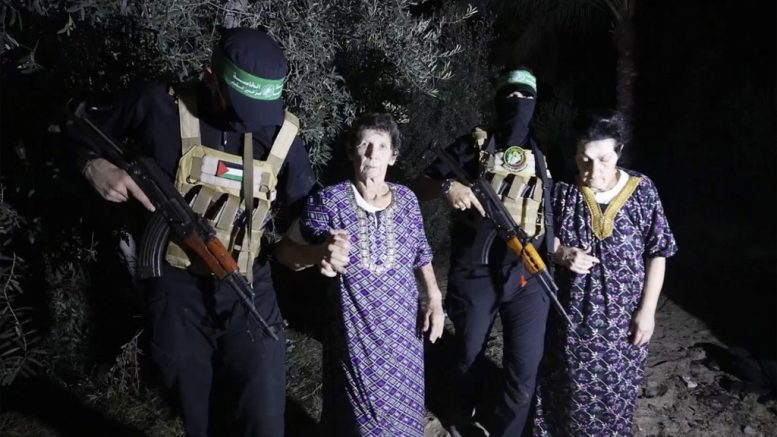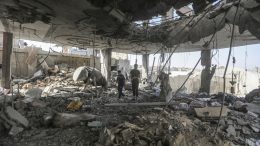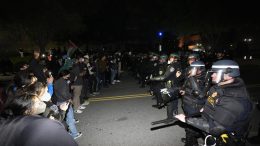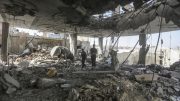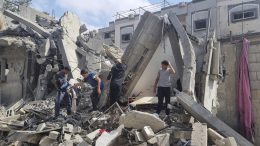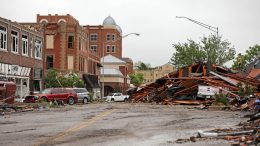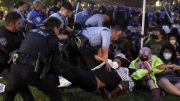RAFAH, Gaza Strip (AP) — Rapidly expanding Israeli airstrikes across the Gaza Strip killed more than 700 people in the past day as medical facilities across the territory were forced to close because of bombing damage and a lack of power, health officials said Tuesday.
The soaring death toll from Israel’s escalating bombardment was unprecedented in the decades-long Israeli-Palestinian conflict. It could signal an even greater loss of life in Gaza once Israeli ground forces backed by tanks and artillery launch an expected offensive into the territory aimed at crushing Hamas.
Gaza’s 2.3 million people have been under increasing bombardment and running out of food, water and medicine since Israel sealed off the territory following the devastating Oct. 7 attack by Hamas militants on towns in southern Israel.
On Tuesday, Israel said it had launched 400 airstrikes over the past day, killing Hamas commanders, hitting militants as they were preparing to launch rockets into Israel and striking command centers and a Hamas tunnel shaft. The previous day, Israel reported 320 strikes. Witnesses and health officials said many of the airstrikes hit residential buildings, some of them in southern Gaza where Israel had told civilians to take shelter.
An overnight strike hit a four-story residential building in the southern city of Khan Younis, killing at least 32 people and wounding scores of others, according to survivors.
The fatalities included 13 from the Saqallah family, said Ammar al-Butta, a relative who survived the airstrike. He said there were about 100 people there, including many who had come from Gaza City, which Israel has ordered civilians to evacuate.
“They were sheltering at our home because we thought that our area would be safe. But apparently there is no safe place in Gaza,” he said.
Fifteen members of another family were among at least 33 Palestinians buried Monday in a shallow, sandy mass grave at a Gaza hospital after being killed in Israeli airstrikes.
Gaza’s Hamas-run Health Ministry said the attacks killed at least 704 people over the past day, including 305 children and 173 women. More than 5,700 Palestinians have been killed in the war, including some 2,300 minors, the ministry said. That includes the disputed toll from an explosion at a hospital last week.
The fighting has killed more than 1,400 people in Israel — mostly civilians slain during the initial Hamas attack.
As the death toll in Gaza spiralled, facilities to deal with the casualties were dwindling. A total of 46 out of 72 health care facilities — including 12 out of 35 hospitals — stopped functioning, the World Health Organization said. Palestinian health officials said the lack of electricity and fuel to power generators from the Israeli blockade, as well as damage from airstrikes, has forced many of the facilities to close.
While Israel has allowed a small number of trucks filled with aid to enter, it has barred deliveries of fuel to Gaza.
Israel says it does not target civilians and that Hamas militants are using them as cover for their attacks. Palestinian militants have fired over 7,000 rockets at Israel since the start of the war, Israel said, and Hamas said it fired a new barrage Tuesday morning.
“We continue to attack forcefully in Gaza City and its environs, where Hamas is building up its terrorist infrastructure, where Hamas is arraying its troops,” said Israeli military spokesman Rear Adm. Daniel Hagari. He again told Palestinians to head south “for your personal safety.”
The U.N. agency for Palestinian refugees said six of its staff were killed in bombings, bringing to 35 the death toll of its workers since the war started.
Amid fears the fighting to spiral into a wider regional war, French President Emmanuel Macron arrived in Tel Aviv on Tuesday and told top Israeli officials that he came “to express our support and solidarity and share your pain” as well as to assure Israel it is “not left alone in the war against terrorism.”
In a joint news conference with Macron, Prime Minister Benjamin Netanyahu said Israel would make every effort to fight the war quickly, “but it could be a long war.”
On Monday, Hamas released two elderly Israeli women who were among the more than 200 people Israel says were taken to Gaza during the attack.
Appearing weak in a wheelchair and speaking softly, 85-year-old Yocheved Lifshitz told reporters Tuesday that the militants beat her with sticks, bruising her ribs and making it hard to breathe as they kidnapped her. They drove her into Gaza, then forced her to walk several kilometers (miles) on wet ground to reach a network of tunnels that looked like a spider web, she said.
Once there, though, her treatment improved, she said. The people assigned to guard her “told us they are people who believe in the Quran and wouldn’t hurt us.” Lifshitz, whose husband remains a hostage, said conditions were kept clean, she received medical care, including medication, and was given the same one meal a day of cheese and cucumber that her captors had.
Lifshitz and 79-year-old Nurit Cooper were freed days after an American woman and her teenage daughter were released. Hamas and other militants in Gaza are believed to have taken roughly 220 people, including an unconfirmed number of foreigners and dual citizens.
On Monday, Hamas released a video showing the handover, with militants giving drinks and snacks to the dazed but composed women, and holding their hands as they are walked to Red Cross officials. Just before the video ends, Lifshitz reaches back to shake one militant’s hand.
Around the same time, Israel’s internal security service, Shin Bet, released a recording showing Hamas prisoners — most in clean prison uniforms, but one in a bloody T-shirt and at least one wincing in pain — sitting handcuffed in drab offices talking about the Oct. 7 attack. The men said they were under orders to kill young men, and kidnap women, children and the elderly, and that they’d been promised financial rewards.
The Associated Press could not independently verify either video, and both the hostages and the prisoners could have been acting under duress.
The Israeli military later dropped leaflets in Gaza asking Palestinians to reveal information on the hostages’ whereabouts. In exchange, the military promised a reward and protection for the informant’s home.
Israel has vowed to destroy Hamas. Iranian-backed fighters around the region are warning of possible escalation, including the targeting of U.S. forces deployed in the Mideast, if a ground offensive is launched.
The U.S. has told Iranian-backed Hezbollah in Lebanon and other groups not to join the fight. Israel and Hezbollah have traded fire almost daily across the Israel-Lebanon border, and Israeli warplanes have struck targets in Syria, Lebanon and the occupied West Bank in recent days.
National Security Council spokesman John Kirby said there has been an uptick in rocket and drone attacks by Iranian-backed militias on U.S. troops in Iraq and Syria, and the U.S. was “deeply concerned about the possibility for any significant escalation” in the coming days.
He said U.S. officials were having “active conversations” with Israeli counterparts about the potential ramifications of escalated military action.
The U.S. advised Israeli officials that delaying a ground offensive would give Washington more time to work with regional mediators on the release of more hostages, according to a U.S. official, who spoke on condition of anonymity because they were not authorized to reveal sensitive negotiations.

